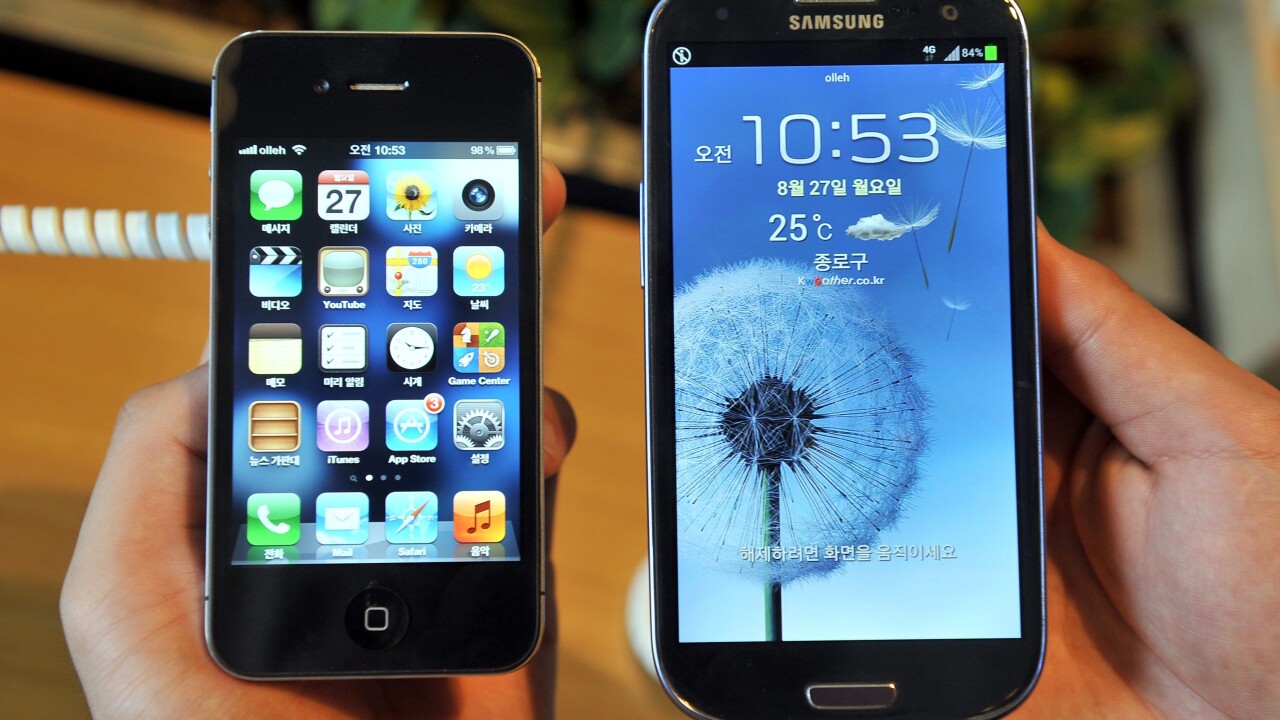
In the US, Apple ended 2012 as the top OEM and it has only further increased its lead with the start of the New Year. Samsung is gaining as well, but not quite as quickly. Rounding out the top five are HTC, Motorola, and LG.
In the platform space, Google is still first courtesy of Android, Apple is second with iOS, but the latter is gaining on the former. In fact, Apple’s gains in the hardware space were so large recently that not only did iOS gain significantly but Android took a hit. Again, rounding out the top five are BlackBerry, Microsoft, and Symbian.
The latest data comes from comScore, which as usual surveyed over 30,000 mobile subscribers in the US (for the second time, it has limited its results to just smartphones, indicating other phones simply don’t matter in the US anymore). The analytics firm says 129.4 million Americans owned smartphones (55 percent mobile market penetration) in January, up 7 percent since October.
Between those three months, here is how the top five smartphones OEMs fared:
As you can see, Apple gained 3.5 percentage points in terms of smartphone subscribers (from 34.3 percent to 37.8 percent) while Samsung jumped 1.9 percentage points (from 19.5 percent to 21.4 percent). HTC fell 1.7 points (from 11.4 percent to 9.7 percent), Motorola dropped 1.4 points (from 10.0 percent to 8.6 percent), and LG managed to gain 0.3 points (from 6.7 percent to 7.0 percent).
Samsung and Apple gained a combined 5.4 points while the other three lost 2.8 points together. In other words, the duo continues to steal share from OEMs not in the top five.
It appears that the iPhone 5 is helping keep Apple ahead, while Samsung is still managing to push forward. With the Galaxy S4 announcement slated for March 14, we don’t expect Samsung to outgain Apple before the device hits the market.
HTC’s continued losses don’t surprise us, but Google really needs to figure out what to do with Motorola. We can attribute LG’s gains to the Nexus 4, although sales have been limited by supply issues.
Yet the most interesting movements in these last three months were on the software side. Although Google is still dominating and Apple has moved ahead in its second place spot, we’ve witnessed Android drop for the first time. Everyone else is losing share as well:
Samsung’s and LG’s gains were apparently not enough to offset the losses of other Android makers as well as Apple’s iPhone 5 push. Last month we noted iOS was growing faster overall when compared to Android, but this most recent snapshot shows Android falling for the first time.
Google lost 1.3 percentage points between October and January (down from 53.4 percent to 52.3 percent). Apple meanwhile increased its share by 3.5 percentage points (moving from 34.3 percent to 37.8 percent).
BlackBerry was down 1.9 points (from 7.8 percent to 5.9 percent), Microsoft lost 0.1 points (from 3.2 percent to 3.1 percent), and Symbian managed to hit yet another new low at 0.5 percent. BlackBerry doesn’t seem ready to recover yet with its BlackBerry 10 launch, as the company continues to be the biggest loser in these studies, month after month. Microsoft’s fall meanwhile appears to be slowing, suggesting it may finally start gaining soon with Windows Phone.
We don’t expect Google’s drop to continue. The Android-iOS duopoly is solid at 90.1 percent market share now; Americans seem perfectly happy to choose between just the two camps, at least for now.
Image credit: Jung Yeon-Je/Getty Images
Get the TNW newsletter
Get the most important tech news in your inbox each week.







